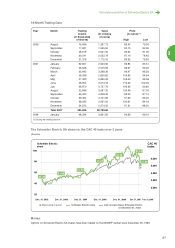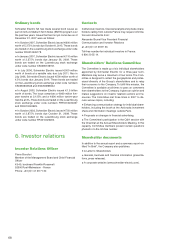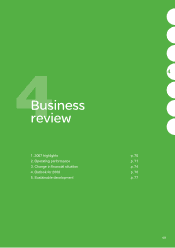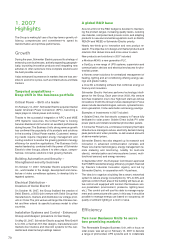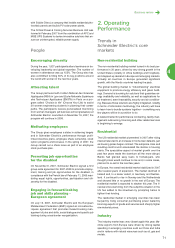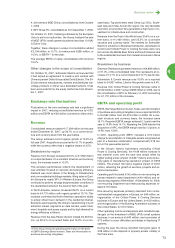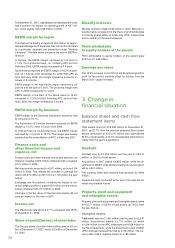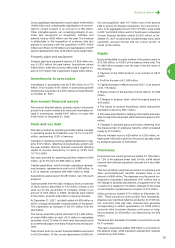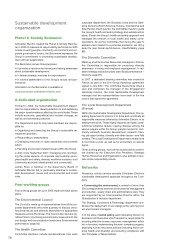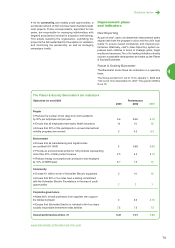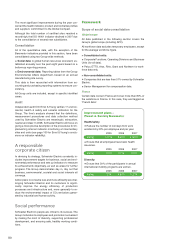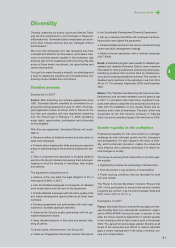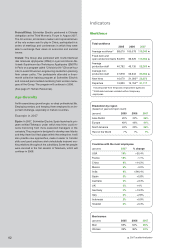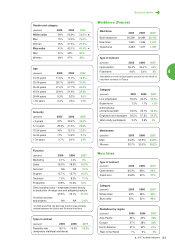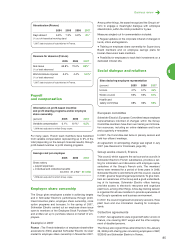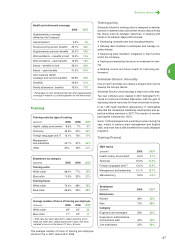APC 2007 Annual Report Download - page 79
Download and view the complete annual report
Please find page 79 of the 2007 APC annual report below. You can navigate through the pages in the report by either clicking on the pages listed below, or by using the keyword search tool below to find specific information within the annual report.
77
4
Business review
5. Sustainable
development
Introduction
Schneider Electric’s sustainable
development approach
An entirely new global situation
Our planet is probably facing a turning point in its history.
After two centuries in which an abundant and inexpensive
energy supply fueled astonishing economic growth, we
have entered a period in which energy is becoming scarce,
and therefore more expensive and, in certain ways, less
reliable.
At the same time, the development cards have been shuf-
fled, with the skyrocketing growth of China and India.
These two emerging economies will represent half the
world’s population in 2050.
As a result, we are entering an era of environmental, soci-
etal and social responsibility for businesses, politicians and
the community as a whole.
Schneider Electric reaffirms
its commitment
Schneider Electric emphasizes sustainable development-
related improvement targets in its new2company program
for 2005-2008. These targets represent a fantastic and in-
dispensable opportunity to motivate team members, grow
the company and differentiate it from the competition.
By supporting customers in a way that is mindful of the en-
vironment, Schneider Electric has positioned itself in new
markets, such as energy efficiency, interoperability and crit-
ical power that will drive growth now and in the years
ahead. Backed by a strategically repositioned business
portfolio, R&D plan and sales and marketing strategy, the
Group is committed to providing innovative, efficient re-
sponses to two key questions:
What products and solutions are needed in the market
to help developed countries waste less energy and pro-
mote environmentally sound production and consump-
tion?
What steps need to be taken in less developed countries
to bring clean, treated water, electricity and sustainable
economic development to the 1.6 billion people who have
no access to energy?
Responsibility, a key concept in sustainable development,
is an integral part of Schneider Electric’s corporate culture
and strategy.
In 2002, Schneider Electric published a set of guidelines
entitled
Our Principles of Responsibility
to give all team
members a common reference.
Similarly, the
Planet & Society Barometer
set up in 2005
involves employees around the world in the Group’s main
sustainable development commitments and allows them to
track the action plans along with other stakeholders, in-
cluding suppliers, customers, shareholders and the com-
munity.
The Group’s good results in 2007 demonstrate both an ad-
vance in Schneider Electric’s sustainable development op-
erations and a steady desire to do better everywhere by
consuming less.
Framework
Reference documents are distributed throughout the
Group so that all team members can embrace this re-
sponsibility approach and apply it in line with local culture
and legislation.
Principles
of Responsibility
In a globalizing world, Our
Principles of Responsibility
pro-
vides a framework to guide each team member’s decisions
and actions. The document outlines the Group’s commit-
ments to each of its stakeholder groups, including em-
ployees, business partners, shareholders, the community
and the planet.
Adopted in late 2002/early 2003, the
Principles of Re-
sponsibility
were drawn up by 600 employees in 15 inter-
national working groups. They provide a frame of reference
for each team member and for the Group as a whole. Fail-
ure to comply with these guidelines is considered serious
misconduct.
Policies
All of the Group’s policies are aligned with the
Principles of
Responsibility.
Environmental issues
First published in 1992 and updated in 2004, Schneider
Electric’s environmental policy was confirmed in 2007. It is
designed to improve manufacturing processes, promote
eco-design and integrate customer concerns in the area
of environmental protection by fostering effective product
and service solutions.
Social issues
Our
Principles of Responsibility
is Schneider Electric’s so-
cial charter. In it, the Group clearly states that "All employ-
ees are entitled to express their cultural diversity and are
managed without discrimination. Team members are en-
couraged to develop new skills and team spirit. At the same
time, they are recognized for their initiatives and risk taking
in contributing to the Company’s growth."
Across the Group, human resources policies are deployed
governing diversity, hiring, international mobility, training,
leadership competencies, total compensation and health.


